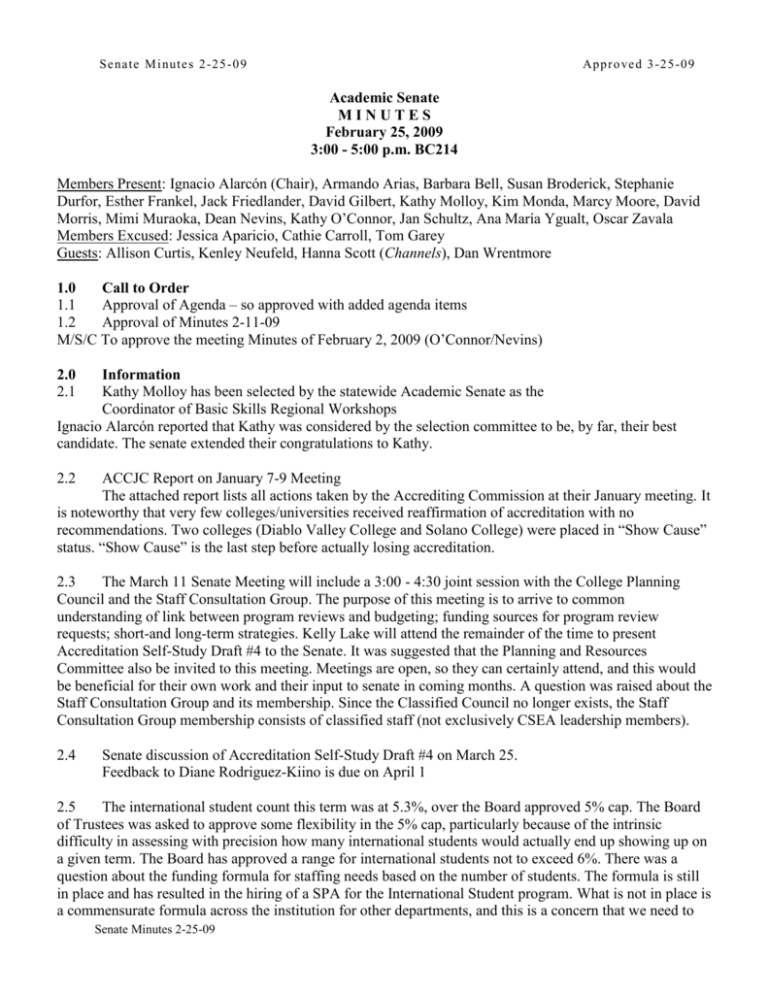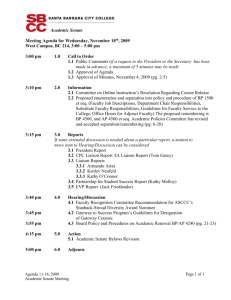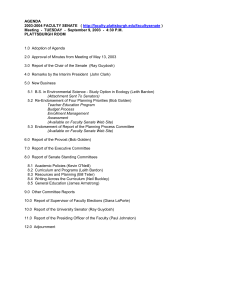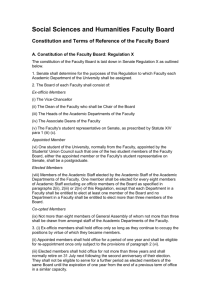02-25-2009
advertisement

Se n ate M i n ute s 2 -2 5 - 0 9 Ap p r o ve d 3 -2 5 -0 9 Academic Senate MINUTES February 25, 2009 3:00 - 5:00 p.m. BC214 Members Present: Ignacio Alarcón (Chair), Armando Arias, Barbara Bell, Susan Broderick, Stephanie Durfor, Esther Frankel, Jack Friedlander, David Gilbert, Kathy Molloy, Kim Monda, Marcy Moore, David Morris, Mimi Muraoka, Dean Nevins, Kathy O’Connor, Jan Schultz, Ana María Ygualt, Oscar Zavala Members Excused: Jessica Aparicio, Cathie Carroll, Tom Garey Guests: Allison Curtis, Kenley Neufeld, Hanna Scott (Channels), Dan Wrentmore 1.0 Call to Order 1.1 Approval of Agenda – so approved with added agenda items 1.2 Approval of Minutes 2-11-09 M/S/C To approve the meeting Minutes of February 2, 2009 (O’Connor/Nevins) 2.0 2.1 Information Kathy Molloy has been selected by the statewide Academic Senate as the Coordinator of Basic Skills Regional Workshops Ignacio Alarcón reported that Kathy was considered by the selection committee to be, by far, their best candidate. The senate extended their congratulations to Kathy. 2.2 ACCJC Report on January 7-9 Meeting The attached report lists all actions taken by the Accrediting Commission at their January meeting. It is noteworthy that very few colleges/universities received reaffirmation of accreditation with no recommendations. Two colleges (Diablo Valley College and Solano College) were placed in “Show Cause” status. “Show Cause” is the last step before actually losing accreditation. 2.3 The March 11 Senate Meeting will include a 3:00 - 4:30 joint session with the College Planning Council and the Staff Consultation Group. The purpose of this meeting is to arrive to common understanding of link between program reviews and budgeting; funding sources for program review requests; short-and long-term strategies. Kelly Lake will attend the remainder of the time to present Accreditation Self-Study Draft #4 to the Senate. It was suggested that the Planning and Resources Committee also be invited to this meeting. Meetings are open, so they can certainly attend, and this would be beneficial for their own work and their input to senate in coming months. A question was raised about the Staff Consultation Group and its membership. Since the Classified Council no longer exists, the Staff Consultation Group membership consists of classified staff (not exclusively CSEA leadership members). 2.4 Senate discussion of Accreditation Self-Study Draft #4 on March 25. Feedback to Diane Rodriguez-Kiino is due on April 1 2.5 The international student count this term was at 5.3%, over the Board approved 5% cap. The Board of Trustees was asked to approve some flexibility in the 5% cap, particularly because of the intrinsic difficulty in assessing with precision how many international students would actually end up showing up on a given term. The Board has approved a range for international students not to exceed 6%. There was a question about the funding formula for staffing needs based on the number of students. The formula is still in place and has resulted in the hiring of a SPA for the International Student program. What is not in place is a commensurate formula across the institution for other departments, and this is a concern that we need to Senate Minutes 2-25-09 continue considering. 2.6 The new administrative liaison to the Faculty Professional Development Committee will be Diane Hollems. 2.7 The Association of College and Research Libraries (ACRL) has selected Kenley Neufeld, Library Director at Santa Barbara City College, as the 2009 winner of the Community and Junior College Libraries Section (CJCLS) EBSCO Community College Learning Resources Leadership Award. The award honors significant achievement in advocacy of learning resources, as well as leadership in professional organizations that support the missions of community, junior and technical colleges. The $500 award and plaque, donated by EBSCO Information Services, will be presented at the ALA Annual Conference in Chicago during the CJCLS Dinner, Friday, July 10. 2.8 SBCC request for policy change: Deletion of Grading section 5044.6 Currently the policy allows for an F to W grade change for students who stopped attending prior to the seventh week. Ms. Curtis reported that this is not in compliance with Title 5. The extenuating circumstances in Title 5 do not allow for a petition based on non attendance. Ms. Curtis would like this to be effective April 1, 2009. The campaign to notify students of the change in policy would begin immediately upon the Board approval of this change. Allison Curtis expressed that she estimates that this affects approximately 100 students per year. 3.0 3.1 Discussion Items Academic Integrity Policy Proposal by Academic Policies Committee. Dan Wrentmore has done a lot of legal work /research to update our Academic Honesty Policy. First thing that we have all noticed: there are several policies, depending on where one looks that deal with Academic Honesty. On the Web, the online policy and the procedures dealing with academic honesty have a reference to an Ed Code that does not exist. On the Catalog there is an Ed Code cited that has nothing to do with academic honesty. Our Academic Honesty policy needs to be updated, in particular revising the possibility of allowing the instructor to give a failing grade for the course based on an academic honesty incident in an assignment. The System Office has instructed colleges to revise this. An instructor can give a substandard grade on the assignment itself, but not automatically give a failing grade on the course because of the incident. Jack Friedlander added, that student attendance may not be a basis for grading. Dan Wrentmore explained what the Academic Policies Committee has done. They have proposed to change the name of the policy from “Academic Honesty to Academic Integrity” and they have cleaned up the references to Ed Code language. The recommended new policy expanded greatly the definition of academic honesty. An immediate problem that some observed is that the recommended policy refers to the “classroom” setting, which does not include online offerings. It was suggested that the Committee on Online Instruction reviews the recommended new policy. Jan Schultz expressed that she felt that the recommended new policy gives the instructor a much clearer road map to follow. Kathy Molloy thanked and commended Dan and the Academic Policies Committee for taking this task on. This work has been needed for a while. Some highlights of the recommended new policy: First offense: the instructor can give a warning and not report it. If the instructor chooses a sanction those sanctions would include: failing grade for assignment; temporary exclusion from class or activity; asking student to do an additional assignment. A sanction would have to be an obligation to report it to the dean of student support. There were several senators expressing Senate Minutes 2-25-2009 Page 2 that if there is no reporting, we have no way of knowing if an offense is the first. It may be advisable to require all offenses to be reported to the dean of student support, so that there is a meaningful record. The next section deals with multiple offenses at the college, which means the dean of student support takes over and gives sanctions such as censure, disciplinary probation, disciplinary suspension, expulsion, etc. It was again suggested that there needs to be a clear reference to the online environment. There was ample discussion on several other items, such as about the language “intent to defraud”. Several examples were offered, such as using someone else’s I.D., or signing in for someone else. Another item discussed was how students would get all this information. Some suggested what other colleges do, namely having students sign a contract. We need to get this ready for the catalog before scheduling deadline. Anita Cole will make available a version of the recommended new policy in a format with numbers instead of bullets, and incorporating some of the obvious changes recommended. Senators were asked to share this with their divisions. Steering Committee will also review this before bringing it back to Senate. 3.2 Proposed Process for Analyzing and Ranking Resource Requests Identified in Program Reviews (Instructional and Faculty-Led Educational Support Programs) (Criteria for Ranking/Timeline ’08-’09) Ignacio reported that in the last two weeks, Dr. Serban had her first division meeting with the Technologies Division. This was a very good opportunity to clarify the newly proposed process for resource requests. Ignacio and Jack have continued working on the proposed procedure. Kim Monda has shared the latest version with the Planning and Resources Committee on February 24. Jack Friedlander mentioned that our proposed timeline is very tight. The proposed timeline includes how feedback will be provided by the different groups, including the Deans and the Senate. A question in everyone’s minds is we will handle equipment replacement from Fund 41 accounts. There is a big concern that equipment item decisions should not be taken out of the hands of those who know best about their needs. For 2009-2010, the budget that we are in the process of building, departments will continue using the same process that we have used up to now. The requests that were submitted have been sent back to departments so they can prioritize the equipment replacement items in consultation with their deans. Deans will then consolidate their divisions’ requests. Once we know the equipment allocations for 2009-2010, we will know what we have to work with. Items that cannot be funded through the division/department process such as a large item replacement or something that is brand new would need to be submitted to the deans and then to CPC for new resource requests. In Fall 2009, when we begin the process early for 2010-2011, departments will be asked to determine the items for which routine expenditures are needed, so this can be incorporated in our budgets. The purpose is that routine items should be identified and incorporated in department’s ongoing budget. A common question has come up: can unused funds for those types of items be carried over? Jack Friedlander explained that this is not the case. However, deans within their division would have flexibility to move funds within the division, after consultation with departments, to help where needs are not met. Senate Minutes 2-25-2009 Page 3 Non routine expenses, for big ticket items which are not incurred annually, need to be identified. During resource allocations, a portion is taken off the top to be placed in a fund meant to replace those non routine items. Jan Schultz expressed that she was opposed to this proposed process, because it places decisionmaking away from departments, and in the hands of “Mommy and Daddy.” This new process does not respect the professionalism of departments’ faculty. She reminded the senate of Tom Garey’s opposition to this process, when Tom referred to the example of Theater Arts Fund 41 being important for their current situation of needing to buy furniture and other items for the temporary buildings during their move out of the Drama/Music building for its renovation. What about emergency expenses because of unanticipated breakdowns? Jack Friedlander said that Each Vice President will count on a contingency fund. This is a different category altogether that we need to plan for, since equipment does break down and emergencies happen. 3.0 Action Items 3.1 Faculty Job Descriptions and Responsibilities Checklists M/S/C To approve the adjusted Faculty Job Descriptions and Responsibilities Checklists (Molloy/Schultz) 4.0 5.1 5.2 5.3 6.0 Reports President’s Report Liaisons’ Reports EVP Report Adjourn Senate Minutes 2-25-2009 Page 4







